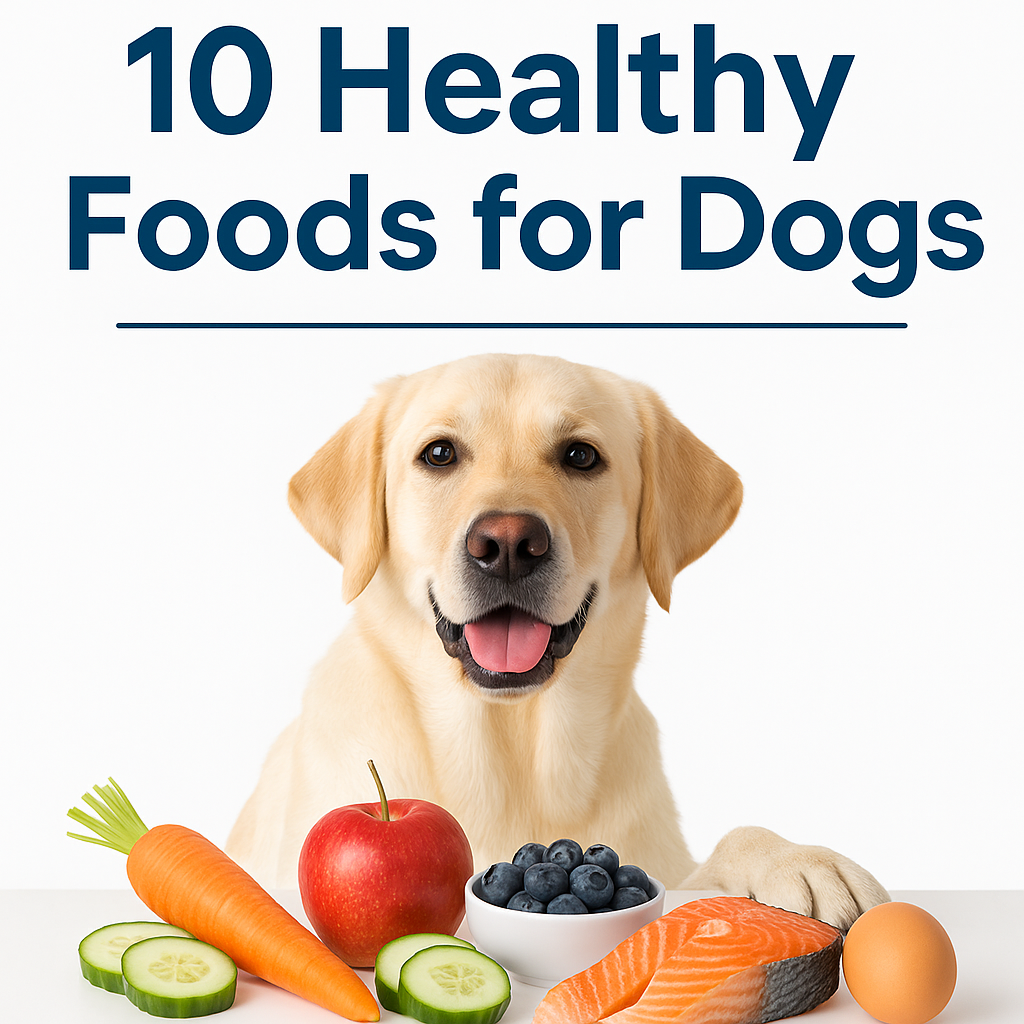
🥕 10 Healthy Foods for Dogs – Safe & Nutritious Choices
Go to the detailed blog
🥕 10 Healthy Foods for Dogs – Safe & Nutritious Choices
Meta Description
Discover 10 healthy foods for dogs that are safe, nutritious, and vet-approved. Help your furry friend thrive with natural, healthy foods!
Why Choosing the Right Foods Matters for Your Dog’s Health
Choosing the right foods for your dog isn't just about keeping them full — it’s about supporting their immunity, energy levels, digestion, and skin health.
In this guide, you'll discover 10 healthy foods for dogs that can make a real difference in your pet’s life.
10 Healthy Foods for Dogs (Focus Keyword)
1. 🥕 Carrots
-
High in beta-carotene for eye health
-
A crunchy, low-calorie snack dogs love
2. 🥬 Spinach
-
Packed with iron, antioxidants, and vitamins
-
Supports overall vitality and immune strength
3. 🥩 Lean Chicken (Cooked, Unseasoned)
-
Excellent protein source for muscle maintenance
-
Helps boost daily energy naturally
4. 🥣 Plain Yogurt (Lactose-Free)
-
Provides probiotics to aid digestion
-
Choose unsweetened, lactose-free types only
5. 🫐 Blueberries
-
Rich in antioxidants that fight free radicals
-
Supports healthy aging and cognitive function
6. 🍠 Sweet Potatoes
-
High in fiber and vitamin A
-
Great for digestion and skin health
7. 🐟 Salmon (Cooked)
-
Rich in omega-3 fatty acids
-
Promotes a shiny coat, skin moisture, and heart health
8. 🍎 Apples (No Seeds)
-
Source of fiber and vitamin C
-
Helps clean teeth and freshen breath
9. 🥒 Cucumbers
-
Low in calories, high in water content
-
Ideal snack for overweight dogs
10. 🍳 Eggs (Fully Cooked)
-
Complete source of protein and amino acids
-
Supports strong muscles and recovery
Positive Changes You’ll See After Feeding Healthy Foods
When you regularly include 10 healthy foods for dogs in your pet’s diet, you can expect:
-
Increased energy and playfulness
-
Shinier, healthier coat
-
Improved digestion and firmer stools
-
Stronger immune system responses
-
Healthier weight management
Proper nutrition leads to both a happier and longer life for your furry companion!
How to Safely Introduce New Foods
-
Introduce new foods gradually over 7–10 days
-
Monitor for signs of allergies like itching, vomiting, or diarrhea
-
Always consult your vet if introducing major diet changes
Feeding your dog new, healthy foods should always be a slow and supervised process.
What to Avoid Even If It Seems Healthy
Some foods that are healthy for humans are dangerous for dogs, including:
-
Chocolate
-
Grapes and raisins
-
Onions and garlic
-
Macadamia nuts
-
Avocado
👉 Always research or consult your vet before offering any new foods!
Choosing Healthy Treats Matters Too
It’s not just main meals — treats also impact your dog’s health!
Choose:
-
Grain-free, natural ingredient treats
-
No artificial flavors, colors, or preservatives
-
Single-protein treats like salmon or duck jerky
Healthy treats can help reinforce training while supporting your dog’s wellbeing.
🛒 Shop Healthy Dog Foods and Treats
-
All-natural, vet-approved dog treats
-
Hypoallergenic, single-ingredient snacks
-
Omega-3 rich supplements for skin and coat health
👉 Check out our Healthy Dog Food and Treats Collection.
External Resource (DoFollow Link)
Learn more about safe foods for dogs from American Kennel Club (AKC).
What Positive Changes to Expect When Feeding Healthy Foods
Feeding your dog 10 healthy foods for dogs consistently can bring noticeable improvements in just a few weeks:
-
Stronger Immune System: Fewer illnesses, quicker recovery from minor issues.
-
Shinier Coat and Healthier Skin: Salmon and eggs boost fur shine and reduce dryness.
-
Better Digestion: Sweet potatoes and yogurt promote gut health, resulting in firmer stools.
-
More Energy and Playfulness: Dogs receiving proper nutrients are more active and enthusiastic.
-
Weight Management: Healthy snacks like cucumbers help overweight dogs shed extra pounds.
Healthy foods create visible benefits, making your dog happier, more energetic, and emotionally stable.
Be Careful: Good Foods Can Be Harmful If Not Handled Properly
Even the best foods for dogs can cause harm if fed improperly. Here’s what to watch for:
-
Cooking Matters: Always cook meats like chicken and salmon thoroughly.
-
Moderation Is Key: Even healthy foods should be given in appropriate portions — too many carrots or sweet potatoes can cause digestive issues.
-
Remove Harmful Parts: Apple seeds contain cyanide, so always core apples before serving.
-
Avoid Seasonings: Never add salt, garlic, onions, butter, or sauces intended for humans.
Natural foods are healthiest when kept simple and fresh.
Choosing Healthy Foods by Age and Breed Size
Different dogs have different nutritional needs based on their age and size:
-
Puppies: Require higher protein and calorie intake for rapid growth.
-
Adult Dogs: Need balanced maintenance diets focusing on digestion and energy.
-
Senior Dogs: Benefit from joint-support foods like salmon (rich in omega-3).
-
Small Breeds: Need more energy-dense foods in smaller volumes.
-
Large Breeds: Benefit from foods supporting joint health and controlled calorie intake.
Customizing your dog's healthy food choices based on their age and breed ensures optimal health.
Pro Tips for Introducing Healthy Foods
-
Start by mixing a small amount into their regular food.
-
Watch for any signs of food allergies (itching, diarrhea, vomiting).
-
Introduce only one new food at a time to easily identify sensitivities.
-
Reward and praise after meals to create positive associations.
Transitioning to healthy foods should be gradual and carefully monitored.

